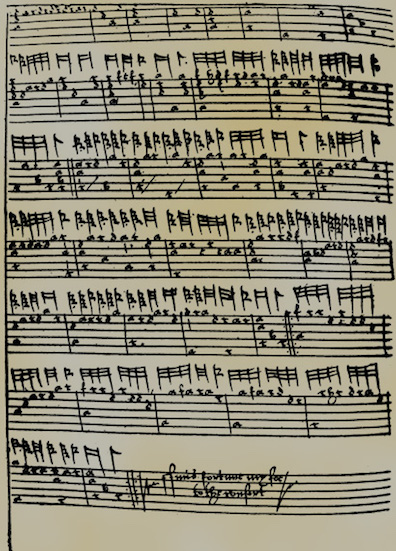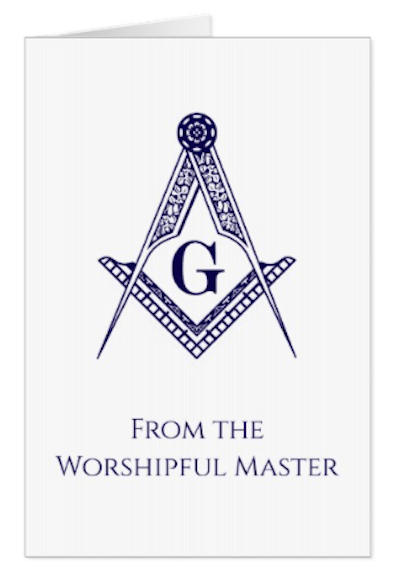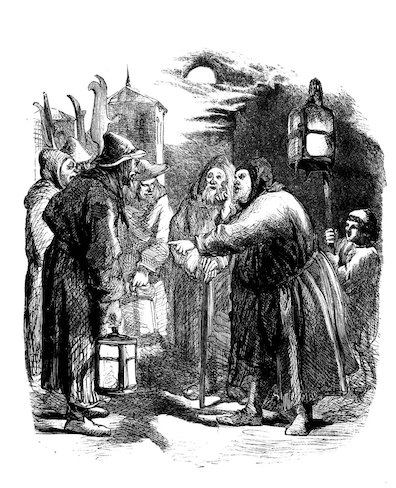In his Shakespeare talk, which is studded with countless
phrases from the bard's works, and again in Circe,
Stephen uses a term for promiscuity that he has encountered in
Much Ado about Nothing: "light-of-love." In Circe
the phrase also shows up in Bloom's mouth: "No, no worshipful
master, light of love." Here the Shakespearean diction of Much
Ado overlaps curiously with the language of Freemasonry
to produce a sentence that can be read in radically different
ways, painting Bloom either as a morally upstanding and
reasonable man or as a clownish and lewd figure.
The OED traces "light of love" to early appearances
that declare it a cousin of Elizabethan uses of "light" to
mean "sexually inconstant." In Euphues (1579) John
Lyly uses the phrase adjectivally: "Ah wretched wench, canst
thou be so lyght of love, as to chaunge with every
winde?" Thomas Proctor's A Gorgeous Gallery of Gallant
Inventions (1578) makes it a noun: "The fickle are
blamed: their lightilove shamed." Later uses cited in
the OED show that it could also be a name for loose
women themselves, as in John Fletcher's The Chances
(1618): "Sure he has encountered / Some light-o-love
or other." Joyce uses the phrase in this last sense.
A popular Elizabethan song called "Light of Love," set to a
danceable "turkeylony" tune (the word apparently came from the
tordiglione, an Italian galliard), figures in the
dialogue in which Hero prepares for her wedding and
Beatrice frets over her newfound love for Benedick while
Margaret needles both of them with sexual innuendo:
Hero.
Why, how now? Do you speak in the sick tune?
Beatrice. I am
out of all other tune, methinks.
Margaret. Clap's
into "Light a' love": that goes without a burden. Do you sing
it, and I'll dance it.
Beatrice. Ye
light a' love with your heels! then if your husband have
stables enough, you'll see he shall lack no barns.
Margaret. O
illegitimate construction! I scorn that with my
heels.
(3.4.41-51)
A "burden" was the bass line in a song, and the word
acknowledges the heaviness of Beatrice's love-longing, but it
also echoes "the weight of a man" from several lines earlier.
"Light...with your heels" suggests energetic dancing but also
evokes "light-heeled," another idiom for unchastity. "Barns"
extends the theme of "stables" but also puns on "bairns,"
children. "Illegitimate" refers not only to faulty logic but
also to the fruits of promiscuity. Shakespeare's lush word
play suggests that the song's lyrics must have sent lustful
thoughts racing through Elizabethan minds.
In Scylla and Charybdis Stephen imagines that the
bedroom of every "light-of-love" in London must have
held a copy of Venus and Adonis,
the story of a sexually aggressive woman. In Circe he
thinks of Shakespeare and two other famous men having been dominated by such women:
"We have shrewridden Shakespeare and henpecked Socrates. Even
the allwisest Stagyrite was bitted, bridled and mounted by a light
of love." From the first of these appearances to the
second no real change of meaning or suggestion occurs: the
flighty Anne Hathaway rode roughshod over Shakespeare, and
Socrates and Aristotle experienced similar humiliations.
But later in Circe Bloom uses the phrase in a new and
puzzling way. When a constable threatens to take him to the
police station Bloom performs certain recognizable Masonic
signs and protests, "No, no, worshipful
master, light of love. Mistaken identity." The ruling
officers of Masonic lodges are often addressed as Worshipful
Master, and many Masons have spoken of their order as being a
"light of love" to the world: tolerant, inclusive, highminded,
and charitable. The duplication of meaning here is astounding:
Bloom signals that he is a Mason and hence someone of high
moral character, while at the same time he either confesses to
sexual immorality himself or admits that he has been involved
with a woman of that type.
But it is not only "light of love" that proves polysemous. In
a personal communication, Arnie Perlstein has called my
attention to the fact that "worshipful master" may
recall the speech of Dogberry, the bumbling constable in the
subplot of Much Ado. This commoner entrusted with the
job of leading the night watch in Messina stumbles upon Don
John's scheme to ruin the reputation of Hero, but he proves
supremely incapable as an investigator. His clownish idiocy
regularly produces malapropisms and other verbal blunders, and
he is obsequious toward his betters. Worship and Master are
much on his lips, as in these exchanges:
Leonato.
Neighbors, you are tedious.
Dogberry.
It pleases your Worship to say so, but we
are the poor duke’s officers. But truly, for mine
own part, if I were as tedious as a king, I could find
in my heart to bestow it all of your Worship.
Leonato.
All thy tediousness on me, ah?
Dogberry.
Yea, an ’twere a thousand pound more
than ’tis, for I hear as good exclamation on your
Worship as of any man in the city, and though I be
but a poor man, I am glad to hear it.
(3.5.18-27)
Conrade.
I am a gentleman, sir, and my name is
Conrade.
Dogberry.
Write down Master Gentleman Conrade. Masters, do you serve God?
Conrade, Borachio.
Yea, sir, we hope.
Dogberry.
Write down that they hope they serve
God; and write God first, for God defend but God
should go before such villains.
Masters, it is
prov'd already that you are little better than false
knaves, and it will go near to be thought so shortly.
How answer you for yourselves?
Conrade.
Marry, sir, we say we are none.
Dogberry.
A marvelous witty fellow, I assure you,
but I will go about with him.
Come you hither, sirrah; a word in your ear, sir. I say to
you, it is thought you are false knaves.
Borachio. Sir, I say to
you, we are none.
Dogberry. Well, stand aside.
'Fore God they are both in a tale.
(4.2.13-26)
The sycophantish Dogberry acts with spectacular ineptitude as
an officer of the constabulary. The sycophantish Bloom speaks
with spectacular ineptitude to an officer of the constabulary,
urging him to come to the aid of a fellow Mason when there is
almost no chance that the officer is a Mason. No one but Joyce
would discover such a connection in the happenstance
resemblance of two words––much less five––but by joining the
two contexts he creates a brilliant play of meanings. By
saying "No, no, worshipful master, light of love," Bloom
simultaneously claims the moral high ground and gives it away,
declaring himself a virtuous Mason and admitting that he is
only a bumbling oaf, a besotted tool.




